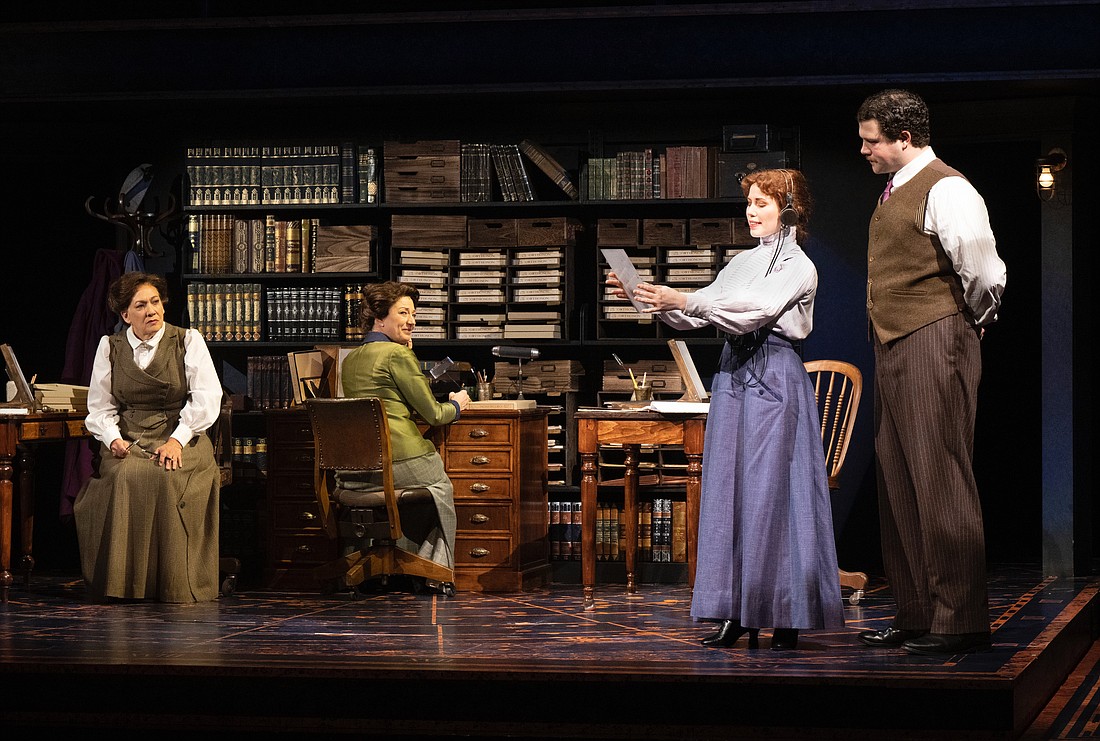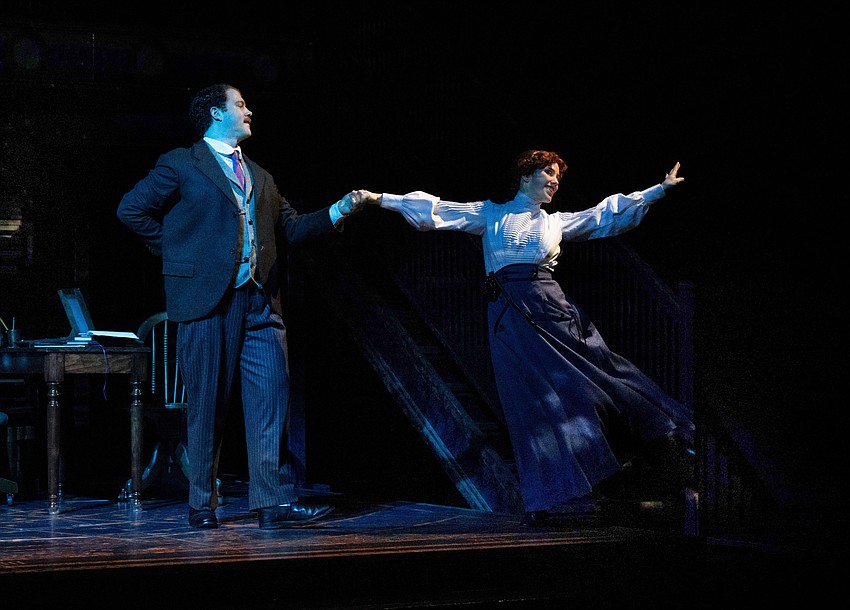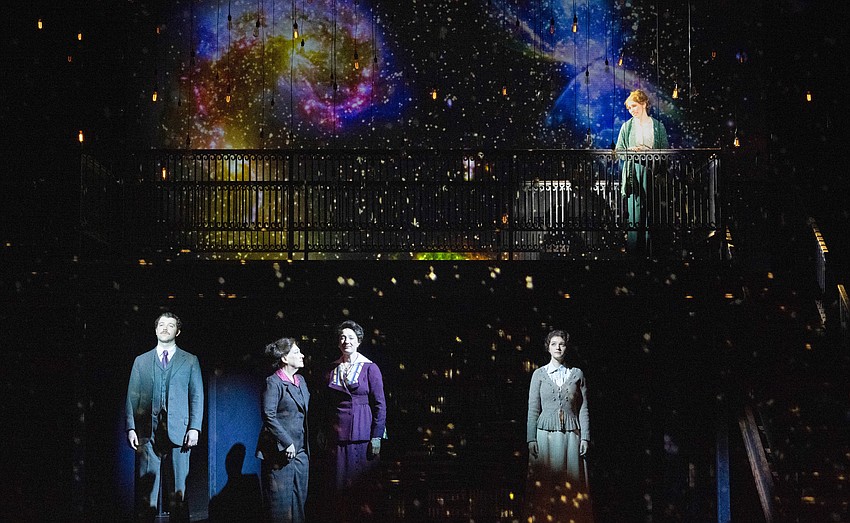- July 26, 2024
-
-
Loading

Loading

The protagonist of Lauren Gunderson’s “Silent Sky” is a computer.
No, not a thinking machine. A woman. This play is set in the early 1900s. The term originally meant the person (usually female) who did the menial number-crunching for male-dominated scientific and academic institutions. In Gunderson’s play, Henrietta Leavitt (Kendra Jo Brook) is the “computer” in question. The character’s based on a real person, born in 1868.
Henrietta had stars in her eyes since childhood. After graduating from Radcliffe College, she found work at the Harvard College Observatory, a pioneering institution led by Edward Charles Pickering.
The story begins on Henrietta’s first day in 1900. All she wants to do is stargaze through the observatory’s state-of-the-art telescope. But they send her to a dingy second-floor office instead. She meets two of Pickering’s “computers.” Williamina (Lise Bruneau), a brilliant, witty Scotswoman, and Annie (Suzanne Grodner) a gruff, no-BS leader — and an early feminist, too. She also meets Peter (Christian Douglass), Pickering’s awkward apprentice. (The Big Man himself never appears.) Henrietta is now, officially, one of Pickering’s “computers.” Unofficially, she’s part of his “harem.” Her daily task?
Like the rest of the “harem,” Henrietta’s a sidereal bookkeeper. The nearby observatory provides a steady stream of photographic negatives. Dark stars on fragile, glass plates; each is a different slice of the sky. Henrietta dutifully records each star’s magnitude, position, and date in a logbook. Dr. Pickering and his boys then try to make sense of that data. Henrietta doesn’t get to analyze it. She’s a woman. That’s not her job. They’re not paying her to think.
Day after day, plate after plate, star after star, Henrietta does her tedious task. Still, she can’t help thinking.
Henrietta’s fascinated by the Cepheid variables in the Magellanic Clouds near our Milky Way galaxy. These stars pulse at regular intervals — but at different rates, depending on the star. Like Richard Dreyfuss’ character in “Close Encounters,” Henrietta has a hunch. This means something — this is important. (She’s right.)
Because thinking isn’t Henrietta’s job, she analyzes the Cepheids’ stellar data on her own time. At night. After everyone else has gone home.
And so her work goes on, both overtly and covertly. Along with several revolutions …
By 1910, Einstein’s has dethroned Newton with his theory of relativity. The suffragist movement is fighting to give women the vote. The shy, stammering Peter (Christian Douglass) is fighting to win Henrietta’s heart. He almost does.

Peter shyly invites Henrietta to accompany him on a slow boat to Europe where she’ll meet all the big-name astronomers. Henrietta says no, though it kills her to say it. She’s obsessed, starstruck. She can’t stop her work.
This means something. This is important.
She won’t stop until she finds out why.
Seema Sueko’s direction has a lyrical, weightless quality. Henrietta has her feet on the ground and her eyes on the sky — but she’s not alone. In their own way, each character wants to slip the surly bonds of Earth. Sueko makes you feel like they could all float off the stage at any moment.
Brook’s Henrietta could’ve easily been a cliche. A plucky female scientist who defies the male establishment and triumphs against all odds? Yeah, yeah. But Brook makes her character live and breathe. She also makes you feel the incandescent life-force bubbling inside Henrietta. Both actor and character are hard of hearing. Both actor and character treat the disability like it’s no big deal. It’s a stellar performance. Pun intended.
As to Henrietta’s cohorts: Bruneau’s Williamina is smart, fun and “sharp as a whip.” She secretly partners with Grodner’s no-nonsense Annie. Her character’s refusal to be bullied or silenced hints of things to come. Zoya Martin is touching as Henrietta’s sister, Margaret (aka “Margie”). She dreamed of being a concert pianist. Henrietta left home to follow her astronomical dreams. Margie shelved her dreams and stayed home with their father, a Congregational minister. (The real-life Henrietta Leavitt had no sister. Margie’s a fictional character — and a stand-in for several torn relationships.) Her character’s love for Henrietta stays strong, despite the emotional and physical distance. Douglass’ shy Peter is winning and sympathetic — and proof that “Silent Sky” isn’t interested in male-bashing. His Peter tries to close the distance with Henrietta, but her heart remains light-years away. He ultimately gives up. Douglass makes you feel the sad calculation behind Peter’s choice.

Ivania Stack’s costumes evoke a formal era when there were no casual Fridays. She traces Annie’s evolution as a suffragist with sashes, banners and bloomers. It’s hilarious —and historically accurate. Milagros Ponce de León’s set is an uncanny mix of earthly and unearthly.
Offices and homes are realistic, but walls and rooms come apart — revealing the cosmic void around humanity’s order. Lighting designer Rui Rita evokes the stars with a scattering of incandescent bulbs, some pulsing. Shawn Duan adds beautiful projections of galactic discs from the James Webb telescope. It’s awesome, if a tad understated. (My inner nerd would’ve liked a cosmic blast across the whole auditorium — but I’m used to planetariums.) Karma Camp choreographs a touching scene of Henrietta and Peter dancing on two stairways to heaven — Henrietta’s unfulfilled romantic dream. Kudos also to André Pluess for his haunting sound design and ethereal compositions — a stand-in for Margaret’s music, interwoven with an old Protestant hymn.
All this flash and filigree serves the story, of course. There’s a happy ending. And a sad one, too.
Henrietta’s mathematical detective work continues. She takes it with her to Wisconsin when her father suffers a stroke and her sister Margaret needs her help. In one beautiful scene, her sister’s music helps her in return. Margie’s noodling out an original composition. Henrietta turns up her hearing aid and listens.
Notes on a piano. Silent intervals. Very much like pulsing stars.
In 1912, Henrietta finally hears the stars’ song.
Her stellar epiphany? Each Cepheid variable has its unique pulse. Each star’s heartbeat is a function of its brightness. QED: Each star’s singular pulse rate reveals its true luminosity — whatever its distance. The distance to the Magellanic Clouds was known. Knowing that …
You’ve got a yardstick to measure the universe.
And other scientists did just that, Edwin Hubble included.
It clued him in to the expanding universe.
Gunderson’s play captures the intellectual excitement of Henrietta’s discovery — but also the cost.
Henrietta Leavitt was raised in a religious home. “Set your minds on things above, not on earthly things,” was the Biblical edict. She obeyed it — though she set her mind on the heavens visible in a telescope. Henrietta’s obsessive, unblinking vision cost her the love of her life, estranged her father, and alienated her sister. The play hints her quest also wrecked her health — and led to her early death.
Was it worth it?
I’d say yes — if we remember the price Henrietta Leavitt paid.
Thanks to “Silent Sky,” she’s not an unsung hero anymore.